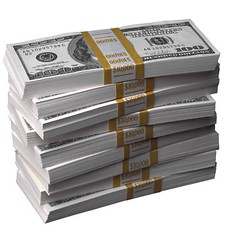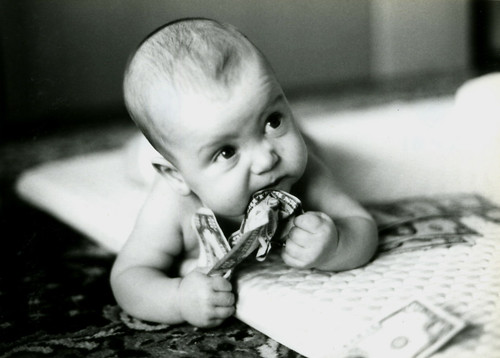- RT @mymoneyshrugged: The government breaks your leg, and hands you a crutch saying "see without me, you couldn't walk." #
- @bargainr What weeks do you need a FoF host for? in reply to bargainr #
- Awesome tagline: The coolest you'll look pooping your pants. Yay, @Huggies! #
- A textbook is not the real world. Not all business management professors understand marketing. #
- RT @thegoodhuman: Walden on work "spending best part of one's life earning money in order to enjoy (cont) http://tl.gd/2gugo6 #
Check Your Bills
Today, I discovered our AOL billing information. Turns out we’ve been paying for dial-up via automatic bill paying that we thought we cancelled in 2000. $1,800 later, we called to cancel. Customer service congratulated us on being loyal members for over 13 years. FML -Jay

- Image by roberthuffstutter via Flickr
I am a huge fan of automating my finances. My paycheck is direct-deposited. My savings are automatically transferred from my checking account to my savings account. Almost every bill I receive regularly is set up as an automatic payment in my bank’s bill-pay system. I even have my debt snowball automated.
The only question left is whether it’s possible to automate too far. Can you automate past the point of benefit, straight into detriment? The primary benefit of automation is knowing that you can’t forget a payment. The other benefit is freeing up your attention. You don’t have to give any focus to paying your bills, freeing you to worry about other things.
The problem with the second benefit is the same as the benefit. If you don’t give your bills any attention, how do you know if there is a problem? If something changes–an extra fee or a mis-keyed payment–you won’t notice because you haven’t been giving the bills any focus.
Sometimes, this means you are paying an extra fee without noticing it. Sometimes, if your due date changes, it can mean late fees. Even if nothing goes wrong, you are missing the opportunity to review what you are paying to ensure your needs are being met as efficiently as possible.
What can you do about it? I put a reminder on my Life Calendar to check my bills each month. I pick one bill each month and try to find a way to save money on it. I review the services to make sure they are what I need and if that doesn’t help, I call and ask for a lower price. If it’s a credit card, I ask for a lower interest rate. For the cable company, I ask if they will match whatever deal they have for new customers.
Every company can do something to keep a loyal customer happy. All you have to do is ask.
Do you automate anything? How do you keep track of it all?
Cheap Drugs – How I Saved $25 in 3 Minutes

- Image by cackhanded via Flickr
Today, I stopped by the grocery store to pick up a couple of prescriptions. I always get the generics, because they are less than half the price of the name-brands, while still being chemically identical. That’s not what I’m talking about, although it did save me about $75 today.
When the pharmacist rang up my medications, the total came up to $35. That just wasn’t right.
Many chain pharmacies have gone to a cheap pricing model for generic drugs. That usually means $4-6 per monthly prescription. Cub Foods doesn’t have that.
So I asked for the price match.
Cub Foods matches prices on generics with whatever large pharmacy is nearby. In this case, they matched Target’s prices, bringing the price from $35 to $10. Instant $25 savings. I just had to wait for them to look up my prescriptions in their match-book.
Pharmacies with cheap generics:
K-Mart offers a 3 month supply for $15.
Target and Wal-Mart both have a 30-day supply for $4.
Publix offers a 14-day prescription for some antibiotics for free. That’s insane! It’s also a heckuva way to get people in the door. “Why don’t you shop for half an hour while I fill your scrip?”
If your pharmacy is anywhere near any of these stores, call and ask if they’ll match the price for generic drugs.
A few tips:
Before you go get your cheap drugs, call ahead and make sure what you need is on the cheap list. Don’t assume.
You won’t be able to use your insurance to buy the cheap generics. The overhead in insurance processing would mean that the pharmacies would be operating at a loss for each prescription. You can’t make that up in volume. Between our copays and deductibles, it’s far cheaper to just pay the generic price without involving the insurance company.
Don’t be afraid of generics. It’s not like Nike. Generics are chemically identical to the name brands. There are two differences: the price and the letter stamped on the side of the pill.
The stores offering cheap drugs are generally bigger stores hoping to use the drugs as a loss leader. Places like Walgreens or CVS make up to 70% of their profits from the pharmacy. They can’t stay open treating that as a loss leader.
How do you save money on prescriptions?
Birthday Parties are Evil
This is a post from my archives.
I hate birthday parties. Well, not all birthday parties. Not even most parties. Just the expensive-for-the-sake-of-expensive parties. The bar-raising parties. The status-boosting parties. I’m done.
My son is seven years older than my first daughter. In those seven years, with only one kid, we managed to spoil him regarding birthday parties. Every party was big and there were a lot of presents. That’s an expensive way to run a birthday and it is a lot of stress. We even moved the parties home, but still invited all of our friends and family. It was much too stressful.
A good friend used the pizza and game place, buying tokens for everyone at the party. That’s incredibly expensive. Even if I wanted to, I couldn’t afford that for three kids. There’s an element of keeping up with everyone around me, but I just can’t make myself care about that anymore. They aren’t paying my debt or cleaning my house. They don’t get a vote.
My plan this year was to have a sleepover for my son. He had five friends spend the night, playing games and watching movies. They giggled and squealed for eighteen hours, all for the cost of some take-and-bake pizzas and snacks. It was a hit for everyone involved. The other parents got a night off and all of the kids had a blast.
My girls are one and two. We’re done with parties for them, too. They got big parties for their first birthdays. Those are parties for the adults; the kids don’t care. In a few years–even a few months–they won’t remember the party. My older daughter’s birthday will be a trip to the apple orchard, followed by cake and ice cream. She’ll get presents. She’ll get “her day”. She’ll remember that her birthday is special, without costing a lot of money.
We want them to have fun. We want them all to feel special. We also want to manage their expectations and keep the parties from breaking the budget. So far this year, it is working.
How do you run a birthday party on a budget?
Babies Are Expensive
From the comments here. The discussion is on how much it costs to have a baby. Edited for clarity.
 Babies” width=”270″ height=”200″ />
Babies” width=”270″ height=”200″ />
Actual birthing costs vary. We’ve had three kids over ten years and birthing costs have varied from $250 out of pocket to $8500. Our highest and lowest price births were 20 months apart. The highest price birth involved induced labor with an epidural. For the lowest out-of-pocket price, I added my wife to my policy before the birth, so she was double-covered. If one of your policies is less than ideal and there are multiple policies available, I recommend doing this. It saved us thousands. All told, If things go well, you could slide for as little as $1500 total.
For the highest price birth, we threw ourselves on the mercy of the finance department. They have a charity fund to pay the bills of the less fortunate. We qualified…barely. If you have a medical bill you can’t afford, ask if there is a grant or donation you can apply for. Always ask if there is some way the bill could be lowered.
Breast-feeding beats the heck out of formula, financially, but breast-feeding doesn’t always work. Ignore the boob-nazis who insist you are slowly killing your kid by using formula. I’ve got 3 kids, and each had different feeding issues.
Baby formula runs $19 for a big container at Sam’s Club, or a large percentage of your soul at most other big box stores. Formula alone will pay for your membership in under a month. For a big eater, that’s $20-30 per week. For a normal eater, 2-3 weeks. For planning purposes, assume $100/month in formula costs for the first six months, when food starts coming into play heavily. After that, the formula expense goes down, but not away for at least 6 more months.
Diapers are painful. Not just the smell–though that hurts, too, sometimes–but the expense. I currently have 2 in diapers; one is potty-training. Our monthly costs for diapers, now, are about $75. It was easily twice that when they were younger. Figure at least $100 per month in diapers. Unless your baby has irritation problems, go with cheap diapers. Leak-guard is a joke. If you are relying on leak-guard to keep the contents inside the diaper, you aren’t changing your baby often enough.
I couldn’t begin to guess at how much you’ll spend on baby clothes. I have never bought clothes for our kids. Whatever didn’t come free from friends and family walked into the house of it’s own volition, following my wife home from the store.
Toys are an almost purely voluntary expense. You’ll get as much as the kids needs free, as presents. You’ll go overboard and give the kids 10 times that, without realizing it. Don’t. For the first four to five months, its fingers and toes will be entertaining enough. After that, if there are more than about ten toys, it’s too many; the kid will never get attached to any of them. Keep it small. It’s better for the kids and the budget. Little kids prefer boxes to toys, anyway. Give the kid a shoebox instead of a Leapfrog. Really.
Portraits suck, too. If you have to get them done professionally, get a membership that covers sitting fees, and use coupons. I recommend JC Penney’s. Using judicious coupons and the membership, we get portraits for under $20.
Baby food is probably cheaper to make in a food processor, but you can’t beat the convenience of the little jars. If you watch sales, you can stock up affordably. Mix every meal with some rice or oatmeal mush to stretch it, without making it unhealthy. Depending on your kids, and how much you listen to the “experts”, this is a nonexistent expense before six months. Our kids started eating baby food in their second months, at least a little bit.
Babies are expensive. Don’t doubt that for a second, but ignore the polled averages when it comes to expense. Hand-me-downs, thrift stores, and good sales cut the expense a lot.
How do you save money and value with a baby in the house?